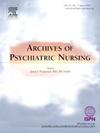研究智能手机成瘾在自尊对土耳其大学生网络约会虐待影响中的中介作用
IF 2.2
4区 医学
Q1 NURSING
引用次数: 0
摘要
目的探讨智能手机成瘾在自尊对大学生网络约会虐待水平影响中的中介作用。方法采用横断面研究方法,选取393名年龄在17-25岁之间的大学生作为研究对象,其中女性50.12%,男性49.88%。使用网络约会虐待量表(CDAS)、Rosenberg自尊量表(RSES)和智能手机成瘾量表(SPAS)作为数据收集工具。数据分析包括中介分析和多元回归模型,以确定在控制人口统计学/社会心理变量的情况下预测网络约会虐待水平的因素。结果低自尊与高网络约会虐待呈显著负相关(r = - 0.518, p < 0.05)。中介分析表明,智能手机成瘾在这一关系中发挥了充分的中介作用。在多元回归分析中,智能手机成瘾、自尊、施暴者身份、性别和年龄被确定为网络约会虐待的重要预测因素,这些变量占网络约会虐待受害方差的20% (R2 = 0.202, F(23,348))。结论自尊通过智能手机成瘾间接影响大学生网络约会虐待水平。我们的研究结果表明,智能手机成瘾、自尊、虐待状况、性别和年龄是网络约会虐待的重要预测因素。旨在增强自尊的心理教育项目和促进有意识使用智能手机的干预措施可能有效降低大学生网络约会虐待的风险。此外,应该在大学里建立关于网络约会虐待的意识提升培训和支持性环境。本文章由计算机程序翻译,如有差异,请以英文原文为准。
Examining the mediating role of smartphone addiction in the effect of self-esteem on cyber dating abuse among university students in Turkey
Objective
The current study aimed to examine the mediating role of smartphone addiction on the effect of self-esteem on the levels of cyber dating abuse among university students.
Methods
In this cross-sectional study, the study group consisted of 393 university students between the ages of 17–25 (50.12 % female, 49.88 % male). The Cyber Dating Abuse Scale (CDAS), Rosenberg Self-Esteem Scale (RSES) and Smartphone Addiction Scale (SPAS) were used as data collection tools. Data analysis included mediation analysis and multiple regression modelling to identify factors predicting levels of cyber dating abuse when demographic/psychosocial variables were controlled.
Results
Findings revealed a significant negative relationship between low self-esteem and high cyber dating abuse (r = −0.518, p < .05). Mediation analysis showed that smartphone addiction plays a full mediating role in this relationship. In the multiple regression analysis, smartphone addiction, self-esteem, perpetrator status, gender, and age were identified as significant predictors of cyber dating abuse, and these variables accounted for 20 % of the variance in cyber dating abuse victimisation (R2 = 0.202, F (23,348)).
Conclusion
This study revealed that self-esteem indirectly affects cyber dating abuse levels in university students through smartphone addiction. Our findings suggest that smartphone addiction, self-esteem, abuse status, gender and age are important predictors of cyber dating abuse. Psychoeducational programmes aimed at strengthening self-esteem and interventions that promote conscious smartphone use may be effective in reducing the risk of cyber dating abuse among university students. In addition, awareness-raising trainings and supportive environments should be created in universities about cyber dating abuse.
求助全文
通过发布文献求助,成功后即可免费获取论文全文。
去求助
来源期刊
CiteScore
3.70
自引率
0.00%
发文量
131
审稿时长
160 days
期刊介绍:
Archives of Psychiatric Nursing disseminates original, peer-reviewed research that is of interest to psychiatric and mental health care nurses. The field is considered in its broadest perspective, including theory, practice and research applications related to all ages, special populations, settings, and interdisciplinary collaborations in both the public and private sectors. Through critical study, expositions, and review of practice, Archives of Psychiatric Nursing is a medium for clinical scholarship to provide theoretical linkages among diverse areas of practice.

 求助内容:
求助内容: 应助结果提醒方式:
应助结果提醒方式:


